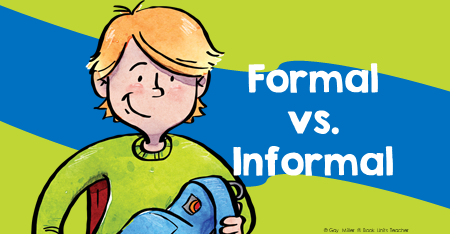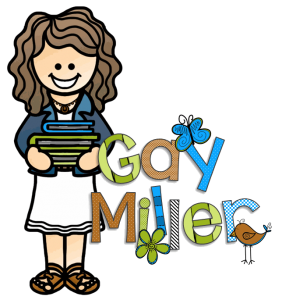
For some students, knowing when to use formal or informal language comes naturally. For others, it is a skill that must be taught in steps. This post offers six teaching ideas from recognizing what is formal and informal to creating formal and informal texts. Start by getting the handout Formal vs Informal Language using the link below.
Get the printable version of these activities.
Activity #1 – Recognizing Formal vs Informal Language
In this activity, students complete a chart. This can be a whole class activity using an anchor chart or an individual practice. A printable is included for students to either write in missing information or sort details depending on the version you want students to use. Using both is a great way to differentiate instruction. In this activity, the first column of the chart lists general circumstances. The next two columns are for examples.
Colloquialisms
Activity #2 – Situations that Call for Formal vs Informal Language
This anchor chart takes literally minutes to create. A header and T-chart are all you need. During class, ask students to name texts or situations that require formal or informal language. As students name examples write them on the chart. Adding clipart “dresses up” the chart but is not essential.
Sort these types of text based on if they should be written formally or informally.
- legal documents
- personal emails
- social media posts
- text messages
- reports
- talking to superiors
- conversation with friends
- informational pamphlets
- public speaking
- advertising
Activity #3 – Sorting Passages by Formal vs Informal Language
In this activity, students will evaluate 6 short passages to determine if they are written formally or informally.
Passage #1
Hi,
We went to Boston for the weekend. Lots to tell you.
See ya soon!
Passage #2
Dear Melissa,
My family and I went to Boston for the weekend. I am looking forward to telling you about our trip when I see you.
Sincerely,
Beth
Passage #3
I went to the senior center this afternoon to visit my grandfather. I wish he could come back home. My family is bothered that he is not living with us.
Passage #4
I went to the old folks’ home this afternoon to see Grandpa. I wish he could come back home. I’m fed up with that stupid place.
Passage #5
I cannot believe that you were able to build a rocket ship from scrap metal. It does look well-built. I agree that this unusual vehicle might actually fly.
Passage #6
You made a what? You’ve got to be kidding! OK, alright, your crazy contraption might actually work.
Activity #4 – Sequencing Variants of Casual to Formal
In this activity, students take six ways of saying the same thing and order them from least casual to most formal. Answers will vary with this activity. The discussion from the exercise is great. The purpose is to get students thinking.
Set #1 – Ways of Saying Good-bye
Take it easy.
I’m out of here.
I gotta hit the road.
See you later.
Have a nice day.
I look forward to our next meeting.
Set #2 – Ways of Saying Congratulations
Congratulations on your well-deserved success.
You rock!
So pleased to see you accomplishing great things.
Nothing can stop you now.
Keep up the great job!
Way to go!
Activity #5 – Comparing Two Passages from Literature
Use the discussion questions provided to determine if these short excerpts from well-known novels are written formally or informally.
Excerpt from The Secret Garden
“It is the child no one ever saw!” exclaimed the man, turning to his companions. “She has actually been forgotten!”
“Why was I forgotten?” Mary said, stamping her foot. “Why does nobody come?”
The young man whose name was Barney looked at her very sadly. Mary even thought she saw him wink his eyes as if to wink tears away.
“Poor little kid!” he said. “There is nobody left to come.”
It was in that strange and sudden way that Mary found out that she had neither father nor mother left; that they had died and been carried away in the night, and that the few native servants who had not died also had left the house as quickly as they could get out of it, none of them even remembering that there was a Missie Sahib. That was why the place was so quiet. It was true that there was no one in the bungalow but herself and the little rustling snake.
Excerpt from Alice in Wonderland
Down, down, down. Would the fall never come to an end? “I wonder how many miles I’ve fallen by this time?” she said aloud. “I must be getting somewhere near the center of the earth. Let me see: that would be four thousand miles down. I think-” (for, you see, Alice had learnt several things of this sort in her lessons in the schoolroom, and though this was not a very good opportunity for showing off her knowledge, as there was no one to listen to her, still it was good practice to say it over) “-yes, that’s about the right distance-but then I wonder what Latitude or Longitude I’ve got to?” (Alice had no idea what Latitude was, or Longitude either, but thought they were nice grand words to say.)
Discussion Questions
- Which type of sentence structure is used? Are the sentences long or short? Does the passage contain sentence fragments?
- Is the vocabulary formal?
- Does the passage use correct grammar?
- Are contractions present?
- Do you find exclamation marks?
- Does the passage contain figurative language such as idioms?
Activity #6 – Changing Informal Sentences to Formal Ones
In this activity, students take informally written sentences and rewrite them to make them formal.
-
- Just dropped by to say we’re leaving at 4.
- Thanks a lot.
- Heard from him lately?
- You don’t hafta do that.
- I’m getting tired of this mess.


